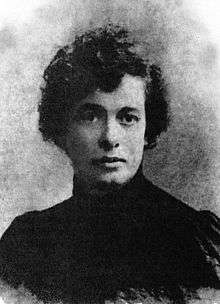Adela Zamudio
| Adela Zamudio | |
|---|---|
 Adela Zamudio | |
| Born |
Paz Juana Plácida Adela Rafaela Zamudio Rivero October 11, 1854 Cochabamba, Bolivia |
| Died |
1928 Cochabamba, Bolivia |
| Nationality | Bolivian |
| Other names | Soledad |
| Occupation | Poet, teacher, activist |
| Known for | Bolivia's most famous poet, founder of the feminist Bolivian movement. |
Paz Juana Plácida Adela Rafaela Zamudio Rivero, or more popularly known as Adela Zamudio (1854–1928) was a Bolivian poet, feminist, and educator. She is considered the most famous Bolivian poet, and is credited as founding the country's feminist movement. In her writing, she also used the pen-name Soledad.
Personal life
Adela Zamudio was born in Cochabamba, Bolivia, in 1854, to an upper-class family.[1] She attended a public elementary school and was also tutored by her father, Don Adolfo Zamudio and her mother, Doña Modesta Ribero de Zamudio.[2]
Career
As a teacher, Zamudio taught at Escuela San Alberto, and later became a director of a girls' high school, which later became known as Liceo Adela Zamudio.[2]
Her poetry and fiction dealt primarily with the social struggles of Bolivia, often with a romantic feeling invoked towards revolution.[3] Non-religious, her writing was highly intellectual.[2] She published her first poem, Two Roses, when she was 15, but did not publish her first book until 20 years later.[3] In 1926 she was awarded the Bolivian Crown of Distinction award.[2] Her pseudonym, Soledad (English: Solitude), was used by her to reflect her often lonely and misunderstood self, who sought to escape conservative Bolivian society. Her work, Quo Vadis, caused a stir amongst upper class women and clerics, and animosity towards her work increased. Her struggles with religion caused her to choose to no longer teach religion at the school she directed and the League of Catholic Women publicly condemned her.[1]
Zamudio also wrote articles for publications and newspapers, promoting democratic reforms and women's rights, including the legalization of divorce.[3]
Legacy
Her birthday, October 11, is celebrated in Bolivia as the "Day of Bolivian Women."[1] Zamudio is a featured figure on Judy Chicago's installation piece The Dinner Party, being represented as one of the 999 names on the Heritage Floor.[4][5]
Works
- Essayos poéticos (Poetic Texts) (1887)
- Violeta o la princesa azul (Violeta or the Blue Princess) (1890)
- El castillo negro (The Black Castle) (1906)
- Intimas (Close Friends) (1913)
- Ráfagas (Squalls) (1914)
- Peregrinando (Travelling) (1943)
- Cuentos breves (Short Novels) (1943)
Notes
- 1 2 3 Mary Ann Tétreault (1994). Women and revolution in Africa, Asia, and the New World. Univ of South Carolina Press. p. 339. ISBN 978-1-57003-016-1. Retrieved 15 December 2011.
- 1 2 3 4 Ángel Flores; Kate Flores (1 April 1986). Hispanic feminist poems from the Middle Ages to the present: a bilingual anthology. Feminist Press. p. 145. ISBN 978-0-935312-54-6. Retrieved 15 December 2011.
- 1 2 3 Francesca Davis DiPiazza (1 March 2008). Bolivia in Pictures. Twenty-First Century Books. p. 71. ISBN 978-0-8225-8568-8. Retrieved 15 December 2011.
- ↑ "Adela Zambudia-Ribero". Elizabeth A. Sackler Center for Feminist Art: The Dinner Party: Heritage Floor: Adela Zambudia-Ribero. Brooklyn Museum. 2007. Retrieved 15 December 2011.
- ↑ Chicago, 256.
References
| Wikimedia Commons has media related to Adela Zamudio. |
- Chicago, Judy. The Dinner Party: From Creation to Preservation. London: Merrell (2007). ISBN 1-85894-370-1
- Bloomsbury Guide to Women's Literature
- Biography by Javier Bustamante
|